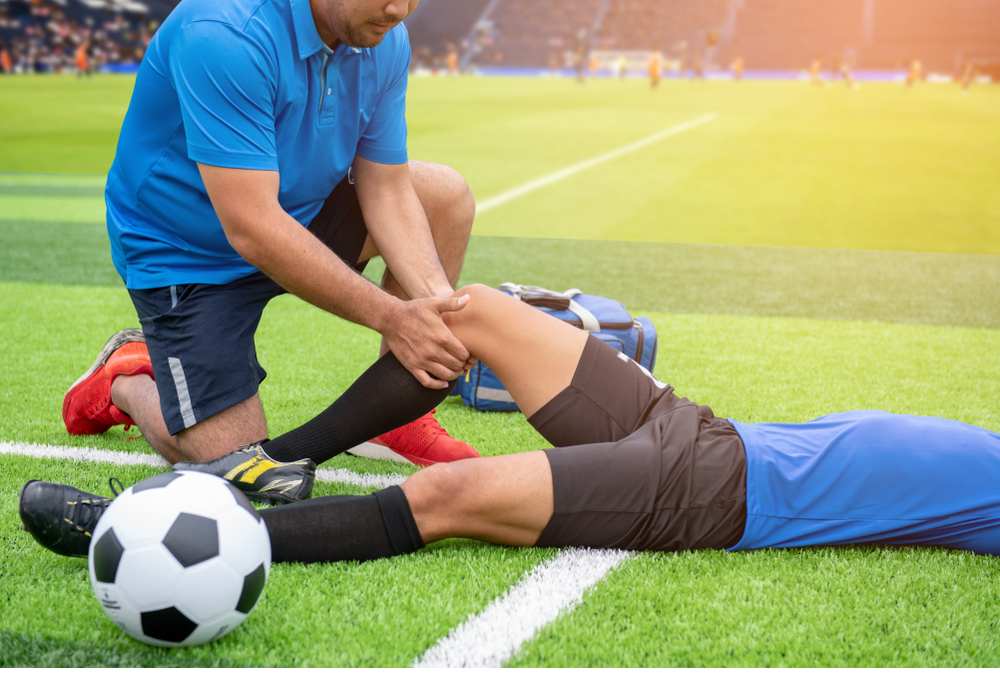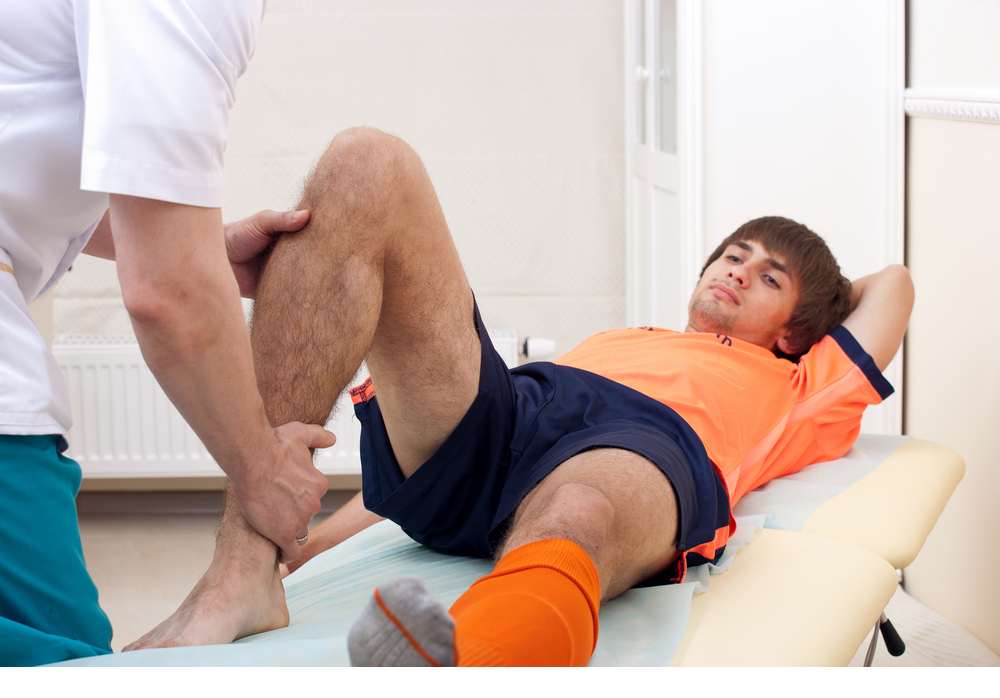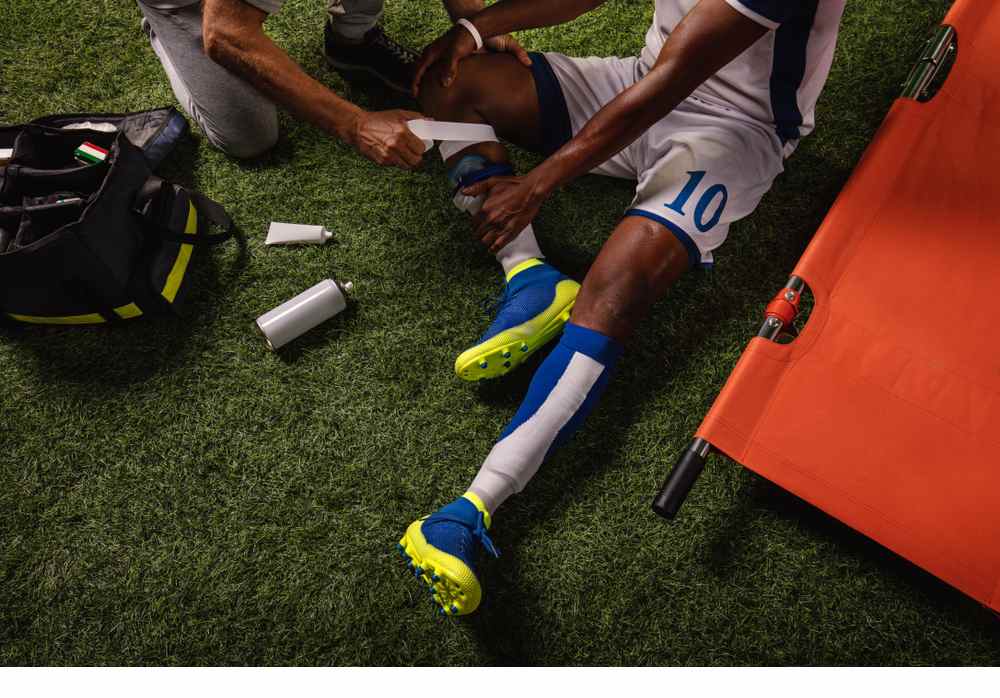Whether you play football or are simply an avid fan, you understand that injuries can happen to anyone. When you tune in to watch the next big game, the announcers start listing off the various players who cannot play because of football injuries. You hear things like “torn ACL” or “concussion protocol,” but what do these injuries actually mean for football players? An injury doesn’t always happen on the field while playing the game. Football injuries can happen during warm-up, exercises, and practices with the team. Contact sports like football require a lot of wear and tear on the body. Football players engage in a combination of running, pushing, blocking, and tackling. These activities put a lot of pressure on joints in the body, especially with recurrent collisions. Staying active with a sport like football offers a variety of health benefits, but it can also put you at risk for injury. Here are five common injuries that can sideline football players.
5 Common Football Injuries
 Football players can get injured while warming up and practicing or while engaging in this highly competitive contact sport. With the rise in popularity of youth sports, football injuries can affect both children and adults. Continue reading to learn more about these five common football injuries, their symptoms, and treatment options.
Football players can get injured while warming up and practicing or while engaging in this highly competitive contact sport. With the rise in popularity of youth sports, football injuries can affect both children and adults. Continue reading to learn more about these five common football injuries, their symptoms, and treatment options.
Concussion
A concussion is a mild traumatic brain injury that can occur from a blow to the head or a severe jostling of the head and neck. Concussions on the football field can occur with helmet-to-helmet contact or from a hard tackle to the ground. The brain is protected by a jelly-like fluid inside the skull known as cerebrospinal fluid that allows the brain to move around slightly. A sudden blow to the head can cause the brain to collide with the skull and damage the brain’s tissues. Common symptoms of a concussion include dizziness, feeling groggy, headaches, and sensitivity to light and sound. A concussion can also cause fatigue, nausea, vomiting, and even loss of consciousness. Head injuries and concussions are common among athletes, especially those who play football. Additional blows to the head throughout a player’s career can put them at greater risk for the long-term effects of a concussion.
Ankle Sprain
An ankle sprain affects the ligaments that connect your leg to your foot. These tough bands of tissues support a specific range of motion and keep the foot and ankle stabilized. When these ligaments become stretched outside their typical range of motion, it can lead to a sprained ankle. The most common type of ankle sprain affects the ligaments along the outside of the ankle. A sudden twist or rolling of the ankle can lead to an ankle sprain. Football players are constantly running, lunging, twisting, and turning while playing the game. Too much pressure on the ankle or a sudden change in directions can cause the ligaments to stretch or tear. An ankle sprain will typically cause pain, tenderness, bruising, and swelling in the area. With a severe ankle sprain, you may not be able to put any weight on the affected ankle.
Hamstring Strain
Hamstrings are the muscles and tendons that run along the back of the thighs from the hips to the knees. Athletes who do a lot of running and sprinting are at greater risk for a hamstring strain or injury. Sudden stops and starts can also overload this combination of muscles and lead to an injury. A hamstring strain, or “pulled hamstring,” refers to a specific type of injury that causes sudden and sharp pain along the back of your thigh. A sudden popping or tearing sensation can also occur with a hamstring tear. The area will become tender to the touch, and you may also experience bruising and swelling along the back of the leg. A severe hamstring strain or tear in one of the muscles can lead to weakness and an inability to put weight on the injured leg. Football players and athletes who have suffered a previous hamstring injury are at greater risk of experiencing a repeated hamstring strain.
ACL Injury
An ACL injury refers to a partial or complete tear of the anterior cruciate ligament in the knee. This is a common football injury because of wear and tear on the knees and the need to pivot and jump while playing the sport. Athletes can tear their ACL from landing wrong from a jump, overextending the knee, or changing directions too fast. A blow to the knee, like an illegal tackle at the knees, can also lead to an ACL injury. A sudden popping sound may accompany an ACL injury, and the pain typically starts immediately. Pain with an ACL injury will typically get worse when you try to bear weight on the knee. Walking, twisting, and turning can make the pain worse and can even worsen the injury. Football players who suffer a torn ACL may need surgery and a reconstruction of the ligament in order to fully recover.
Meniscus Tear
Another knee injury commonly affecting football players is a meniscus tear. The meniscus is a piece of cartilage that cushions the thighbone and shinbone. Each knee joint has two menisci that provide shock absorption and support for the area. Too much pressure or a sudden rotation of the knee can lead to the meniscus getting damaged or torn. A tackle to the knees, which is an illegal move in football, can lead to a torn meniscus. A sudden pivot, turn, or deep squat can also lead to a meniscus tear. Symptoms of a meniscus tear include the sudden onset of pain accompanied by a popping sound in the knee. A torn meniscus will lead to swelling in the area and a reduced range of motion. You may have difficulty putting weight on your knee and feel like the joint is locking or catching.
Treating Sports Injuries
 While treatment for a football injury will certainly depend on the type and severity, there are a few standard recommendations to help athletes recover. The most important thing you can do for a football injury is to rest. Resting can involve limiting the use of the area where the injury occurred and taking a break from physical activity that may make the injury worse. A common way to remember the treatment regimen for minor injuries is called the RICE method: rest, ice, compression, and elevation. Icing the area can help reduce swelling and provide a temporary numbing sensation to help with the pain. After 72 hours, you may also alternate with a warm compress or heating pad to help soothe aching muscles. Over-the-counter pain and anti-inflammatory medications may also provide temporary relief from a minor football injury.
While treatment for a football injury will certainly depend on the type and severity, there are a few standard recommendations to help athletes recover. The most important thing you can do for a football injury is to rest. Resting can involve limiting the use of the area where the injury occurred and taking a break from physical activity that may make the injury worse. A common way to remember the treatment regimen for minor injuries is called the RICE method: rest, ice, compression, and elevation. Icing the area can help reduce swelling and provide a temporary numbing sensation to help with the pain. After 72 hours, you may also alternate with a warm compress or heating pad to help soothe aching muscles. Over-the-counter pain and anti-inflammatory medications may also provide temporary relief from a minor football injury.
If you have a moderate to severe football injury with severe pain, swelling, instability, or inability to move, seek treatment right away. Visit a doctor who specializes in treating athletes and has the knowledge and skills to address a wide range of football injuries. Depending on your injury, your doctor may recommend physical therapy to help you regain strength and range of motion. In some cases, surgery may be necessary to treat your football injury. Physical therapy after a surgical procedure will help you recover faster and ensure you have the strength and mobility to return to the field. If you have difficulty breathing, fever, or dizziness after a football injury, seek emergency medical attention immediately, as these may be signs of a serious condition. Never try to play through the pain with a football injury because you can end up making the injury worse and adding time to your recovery period.
Preventing Sports Injuries
Incorporate proactive stretches and exercises into your warm-ups and training to prevent sports injuries from occurring. The best way to prevent a football injury is to make sure you warm up properly. A warm-up gets its name because of how stretching and moving your body will literally warm up your muscles. Cold muscles are more likely to become overstretched or injured, while warm muscles have more flexibility and mobility. A physical therapist can also help you prevent sports injuries by walking you through proper techniques and equipment to ensure you are protecting your body as best as possible. Follow your doctor’s advice and avoid overdoing it or playing through the pain. If your body doesn’t get enough time to fully recover, you put yourself at risk for another sidelining injury. A physical therapist can help you ease back into exercises that will help promote healing and help you stay fit so you can return to football with a healthy body.
At AICA Orthopedics, we treat a wide range of football injuries for athletes of all ages and levels. Our doctors include orthopedic surgeons, neurologists, chiropractors, and physical therapists who work together to provide you with a personalized plan for treatment, recovery, and prevention. Visit an AICA Orthopedics clinic near you to get the quality and comprehensive care you need to effectively recover and return to the football field stronger than ever.





